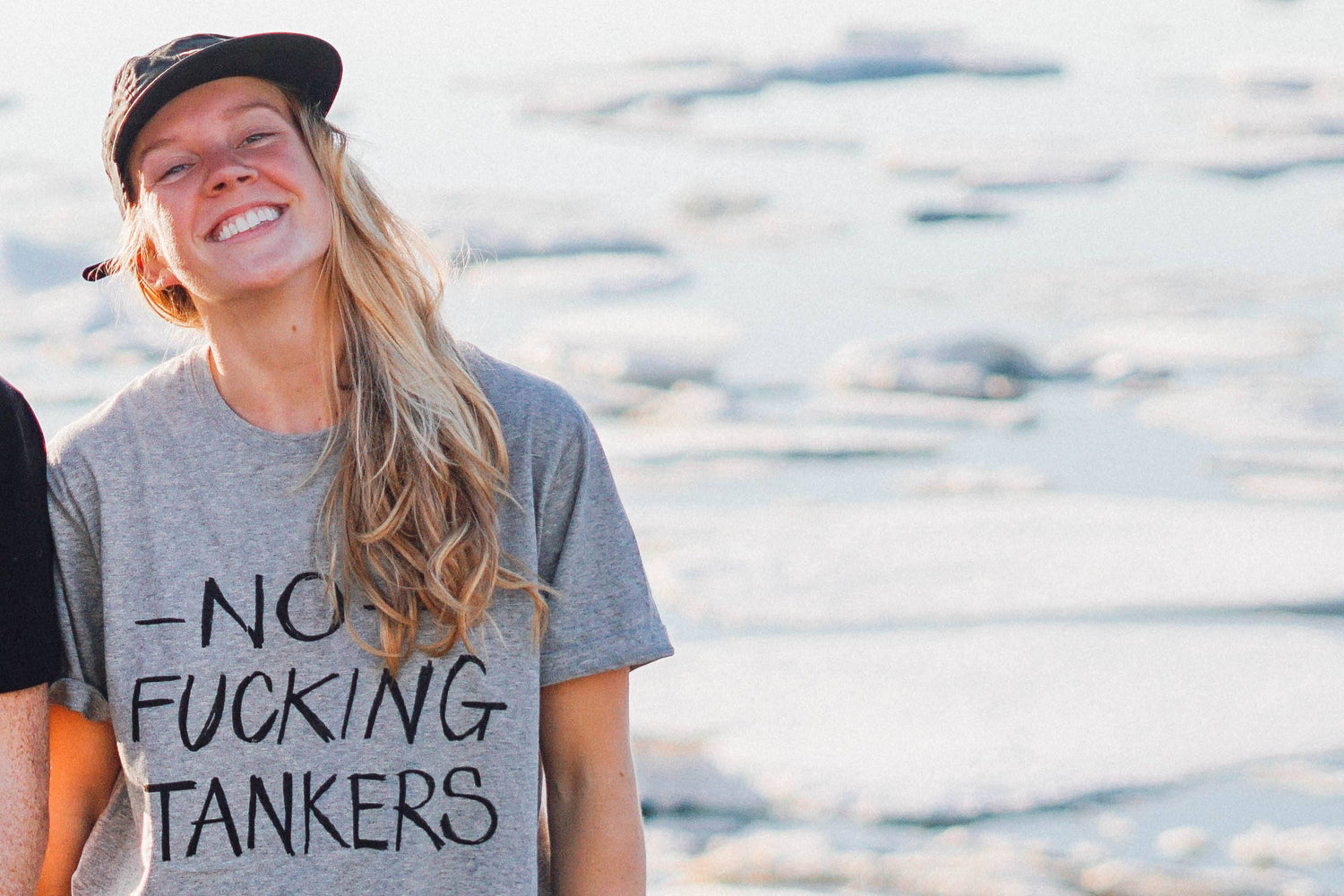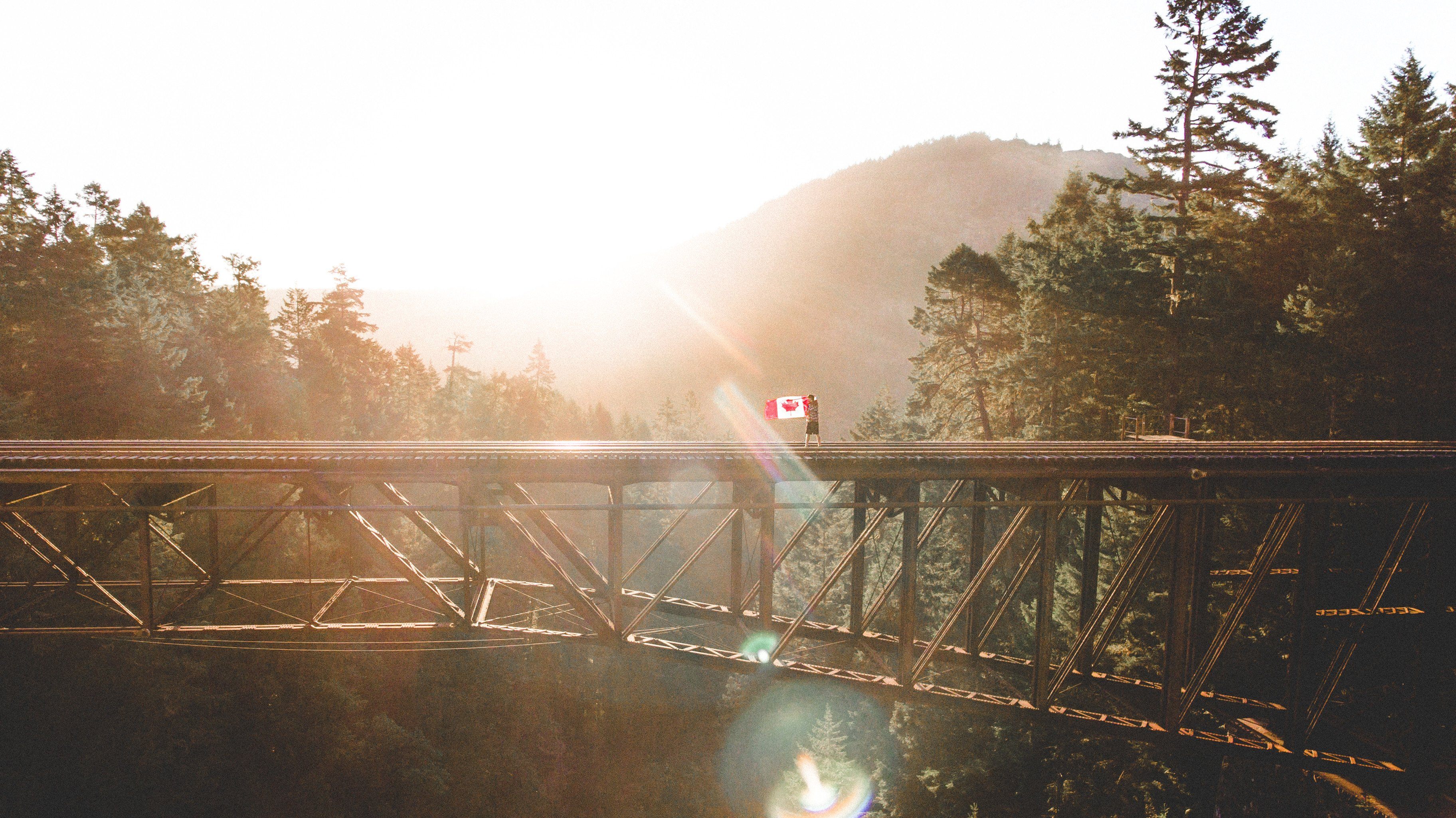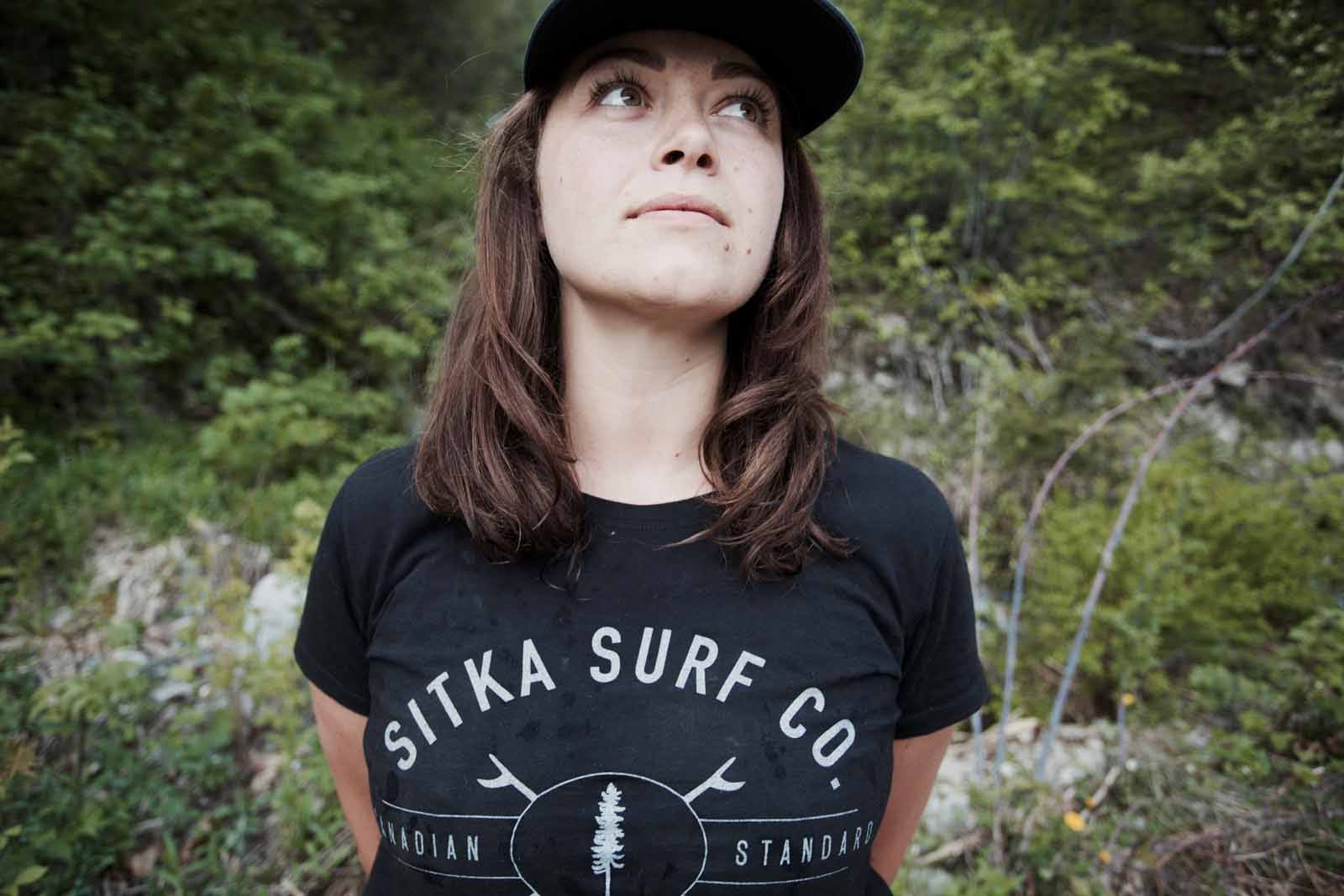
Q: Who is Sofie Agger?
A: Sitka family member, Sofie Agger, is a one-of-a-kind gal who had the unique opportunity to spend 8 weeks in the Canadian high-Arctic, doing a study on environmental changes. The work is led by the University of British Columbia's Dr. Greg Henry, in collaboration with Northern Scientific Training Program and is part of extensive research spanning the past two decades. From tracking polar bears to monitoring ice and glacier melt, to investigating the responses of high-Arctic tundra plants and animals to climate change, this girl really had a once in a lifetime opportunity.

Q: Did you sleep in an Igloo?
A: I really wish I could say yes to this because that would have been so sweet to try, but our accommodation was actually pretty unique and I wouldn’t have traded it for anything else.
We lived in Alexandra Fiord, which at one point was home to the most northerly RCMP post in Canada. It’s tucked away on the east coast of Ellesmere Island at 78 degrees north, about 1300km south of the geographic North Pole – so basically Santa’s backyard. The post was built in 1953 and the original purpose was to populate the area and reinforce Canada’s territorial claim in its northern archipelago where sovereignty was being challenged. The RCMP, alongside a few Inuit families, called Alex home for a number of years, but in 1963, the post closed and the buildings were abandoned. Since then the buildings have remained relatively untouched, and we were lucky enough to be able to stay there for the 6 weeks we spent at Alex. There are 6 or so buildings, all painted white with light blue trim, and it feels like they’ve been frozen (pun intended) in time since they were left in the 60s – it was basically like living in a museum. The paint was peeling off the walls everywhere and there were shelves full of old canned food (picture Andy Warhol’s Campbell’s Chicken Noodle Soup print), books, medicine, enamel dishware, half-finished model trains and planes, magazines, old photo developing equipment, log books, you name it. I found it so interesting to look through because it felt as though they had just upped and left in a day, leaving everything behind the way it had always been for them.
Long story short, to sleep in an Igloo remains on my bucket list... to sleep in an abandoned RCMP post north of the Arctic circle: check.

Q: What Sitka item did you bring that was most fruitful?
A: Oh man, every Sitka goodie I brought with me was fruitful in its own way, but I think the real hero was the Waxed Cotton Camp Hat - and for a very specific reason that starts with a B and ends with UGS. Mosquitoes and other winged creatures took up airspace in numbers that I have never come close to experiencing before, which turned out to be a real big pain when you’re working outside in the field all day long. The cap had seemingly magical qualities in that not a lot of bugs ventured under the brim, and it also facilitated a pretty sweet hat + bug net combo on exceptionally buggy days; which was also great because it turns out there are few ways to look more stylin’ on the tundra than with a giant bug net over your head. So the hat was a huge win: not only did the hat keep the sun out of my eyes, it kept bugs out of my face. As I’m sure anyone who has basked in the glory of a Sitka tee knows, their softness is not easily rivaled.

Q: What did you miss most?
A: This list could definitely get pretty long, but I think what I missed the very most were west coast sunsets and huge trees in wet, green forests. I am a total sucker for a good sunset and have sought out my fair share of mountain tops and beaches and everything in between; and being surrounded by ferns and moss and tall trees is one of my favourite ways to spend time and decompress – but being that far north of the Arctic Circle means that the sun never sets in the summer and nothing ever grows very tall. The closest thing to a tree up there is arctic willow, which creeps horizontally along the ground and forms these massive carpet-like areas that are essentially tiny little old growth forests. Only it doesn’t get much more than 15cm tall. Of course, I missed a whole assortment of humans (and my dog, obviously), but we had a satellite phone so staying in touch wasn’t actually that hard. Sunsets and tall trees were complete impossibilities; so no matter how impressive the midnight sun and plant life were, they didn’t quite compare.
I also really missed summer warmth, wearing t-shirts and shorts and just feeling the wind and sun on my skin, but it averaged about 5 degrees up there so I was pretty bundled every day. I would dunk in the river or ocean a couple times a week, and it felt so nice to not have 100 layers on for the couple seconds before either plunging into the freezing water or the mosquitoes finding me.
Aaaaannnd... Google. I really love a good break from the Internet and think that it’s something everyone should practice, but at times it was hard not to miss the usual instantaneous access to information. Someone would say something like “I read that some guy ate an entire airplane” and the automatic response would be “Google that! Oh, wait...” We ended up with a really long and really weird Must Google When We Get Home list. We also played a lot of Boggle in the evenings, and the legitimacy of words was often super questionable – but the only dictionary up there had sections N-Q ripped out by a polar bear when it broke into the building and chewed everything up. I didn’t miss social media all that much, having to “Google” using old beat up encyclopedias and dictionaries from the 50s definitely made me appreciate the availability of information and the ease of access we have to it nowadays.

Q: Was the first thing you ate when you came home?
A: I basically dove head-first into a bag of sea salt kettle chips and a Ben and Jerry’s ice cream when I got home. I probably thought or talked about chips and ice cream at least once a day, because even though we actually ate shockingly well up there and had fresh food right 'till the very end, things were a bit lacking in the snack department. There were tons of boxes of old Ritz crackers that expired in 2007, so even though we aren’t super proud of this, we ate them anyway despite the fact they mostly tasted like salty cardboard. We also tried to make ice cream once with one of those old manual egg beaters, skim milk powder, and sea ice; but despite our best beating efforts, it turned into more of a Slurpee. We just topped it with Nutella and ate it anyway.

Q: Ellesmere Island is the 10th biggest island in the world. Anything to say about that?
A: I could probably spend the rest of my life trying to properly articulate how it felt to live in the remoteness and isolation of Ellesmere Island. I think mostly because looking back on it, and even in the moment, it doesn’t even seem real.
I find that it helps to put the situation into some context, so for example, Great Britain is the 9th largest island in the world and has a population of over 60 million. Granted, it’s much further south. Ellesmere runs along the northwest coast of Greenland and is home to only around two hundred people, most of whom live on the island’s southern tip. At 78 degrees north in Alexandra Fiord, we were the only 5 people living on Ellesmere’s entire east coast.
It took 3 days and 6 pit stops to fly the give-or-take 4,000 kilometers from Vancouver to Alexandra Fiord. Having so much anticipation build up for months prior to leaving and throughout the long journey there, it was a bizarre feeling when we finally got dropped off and then watched the tiny plane fly away again. I’ve never felt so small and insignificant and stranded in my entire life. But in a really good way. It was dead quiet, the landscape was impossibly large and unbelievably beautiful, and there we were: just 5 tiny humans in the front yard of our new home for the summer, like “okay, this is it I guess.”
Other than the four others and a helicopter pilot who came for a few days to fly us around, I didn’t see a single another human for 6 weeks; which didn’t even seem that strange until I got back to Vancouver and all of a sudden there were tons of humans absolutely everywhere. Considering the isolation and that it was just the five of us living and working together day in and day out, I lucked out pretty hard. I enjoyed the company of the others so much, and had a ton of fun and a lot of laughs with them – and I’m not just saying that because I think they might end up reading this. But just in case they are: S/O to Katie, Cassandra, Jamie and Greg for being huge beauties.
Despite the fact that we were about as far away from anything and anyone as possible, it came to be home pretty quickly. Gaining familiarity with my surroundings sort of just normalized the situation in a way, and in no time, I was running around the tundra in my Birkenstocks and pajamas like it was no big deal. But no matter how normal things became, I’d still get these sensory overloads while watching a polar bear as I brushed my teeth or while kayaking in the midnight sun between icebergs and walruses. At times like that my brain would just explode, like “where the actual heck am I right now...” I still can’t wrap my head around it.
I’ve sought out untouched and off-the-grid places for many years now and love the feeling of solitude and connection to nature that comes with it, but being in the Arctic really took that to a whole other level for me. It feels cliché to say that it was a life-changing experience, but it truly was in every single way.

Q: What was your biggest fear?
A: You mean other than getting eaten by a polar bear? Nah, I think I was mostly just filled with nervous excitement. And a whole lot of it. It was so hard to know what to expect both physically and mentally, and I had butterflies in my stomach about everything from the remoteness and isolation to getting the fieldwork done and done properly, making sure I soaked up every second of the experience in case I never get to go back, not getting hurt, and just surviving in general.
I’m not sure I would call it fear per se, but actually just seeing the Arctic with my own eyes was something I definitely found that I was nervous about. As an environmental studies student, I am painfully aware of climate change and the dangers of global warming, as well as the fact that the Arctic is warming significantly faster than any other place on Earth. The Arctic may be far away and difficult to relate to, but it’s not ‘out of sight, out of mind’. It’s not like the effects of warming will be contained there and won’t be a problem elsewhere – the repercussions of climate change in the Arctic are and will be global and long-lasting. So, it was a sort of a scary thought to be going to the place that is like the poster child of climate change and one of the most obvious indicators that we, as humans, have evolved unsustainably and need to adjust our ways of life in order to protect our planet.
I know that what I experienced was only a tiny sliver of the Arctic, but witnessing it firsthand and being able to better appreciate what is at stake, it breaks my heart that our actions as a global society of overconsumption and environmental negligence are threatening its very existence and putting ourselves and our Earth in jeopardy.

Photos by Sofie Agger


